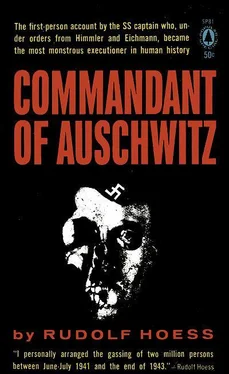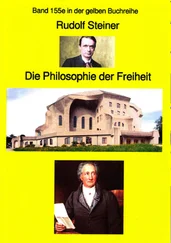My second worship was my family. To them I was securely anchored. My thoughts were always with their future, and our farm was to become their permanent home. In our children both my wife and I saw our aim in life. To bring them up so that they could play their part in the world, and to give them all a stable home, was our one task in life.
So now my thoughts turn chiefly to my family. What will become of them?
It is this uncertainty concerning my family’s future that makes my imprisonment so hard to bear.
I gave myself up for lost from the beginning and I am concerned no longer about my personal fate, but only about that of my wife and children, for what will happen to them?
Fate has played strange tricks on me. How often have I escaped death by a hair’s breadth? During the First World War, or in the Freikorps, accidents at work, the car smash on the autobahn in 1941, when I ran into an unlighted truck and yet was able, in the fraction of a second left to me, to wrench my wheel around so that the impact came on the side and we all three escaped with cuts and bruises, although the front of the car looked like a concertina. Then there was the riding accident in 1942, when I was thrown onto a rock with the heavy stallion on top of me, and my ribs were broken. And there were the air raids too, when time and again my life did not seem worth a straw. Yet I always managed to survive. There was that other car accident too, shortly before the evacuation of Ravensbrück. Everyone thought I was dead, and it seemed impossible that I should recover, yet I did.
Then the vial of poison that broke just before my arrest.
On every occasion fate has intervened to save my life, so that at last I might be put to death in this shameful manner.
How greatly I envy those of my comrades who died a soldier’s death.
Unknowingly I was a cog in the wheel of the great extermination machine created by the Third Reich. The machine has been smashed to pieces, the engine is broken, and I, too, must now be destroyed.
The world demands it.
I could never have brought myself to make this confession of my most secret thoughts and feelings had I not been approached with a disarming humanity and understanding that I had never dared to expect.
It is because of this humane understanding that I have tried to assist as best I can in throwing some light on matters that seemed obscure.
But whenever use is made of what I have written, I beg that all those passages relating to my wife and my family, and all my tender emotions and secret doubts, shall not be made public.
Let the public continue to regard me as the bloodthirsty beast, the cruel sadist, and the mass murderer; for the masses could never imagine the commandant of Auschwitz in any other light.
They could never understand that he, too, had a heart and that he was not evil.
These writings consist of 114 pages. I have written them voluntarily and without compulsion.
Cracow February 1947 Rudolf Hoess
APPENDIX 1
The final solution of the Jewish question in Auschwitz concentration camp
In the summer of 1941, I cannot remember the exact date, I was suddenly summoned to the Reichsführer SS, directly by his adjutant’s office. Contrary to his usual custom, Himmler received me without his adjutant being present and said in effect:
“The Führer has ordered that the Jewish question be solved once and for all and that we, the SS, are to implement that order.
“The existing extermination centers in the East are not in a position to carry out the large actions which are anticipated. I have therefore earmarked Auschwitz for this purpose, both because of its good position as regards communications and because the area can easily be isolated and camouflaged. At first I thought of calling in a senior SS officer for this job, but I changed my mind in order to avoid difficulties concerning the terms of reference. I have now decided to entrust this task to you. It is difficult and onerous and calls for complete devotion notwithstanding the difficulties that may arise. You will learn further details from Strumbannführer Eichmann of the Reich Security Head Office who will call on you in the immediate future.
“The departments concerned will be notified by me in due course. You will treat this order as absolutely secret, even from your superiors. After your talk with Eichmann you will immediately forward to me the plans of the projected installations.
“The Jews are the sworn enemies of the German people and must be eradicated. Every Jew that we can lay our hands on is to be destroyed now during the war, without exception. If we cannot now obliterate the biological basis of Jewry, the Jews will one day destroy the German people.”
On receiving these grave instructions, I returned forthwith to Auschwitz, without reporting to my superior at Oranienburg.
Shortly afterward Eichmann came to Auschwitz and disclosed to me the plans for the operations as they affected the various countries concerned. I cannot remember the exact order in which they were to take place. First was to come the eastern part of Upper Silesia and the neighboring parts of Polish territory under German rule, then, depending on the situation, simultaneously Jews from Germany and Czechoslovakia, and finally the Jews from the West: France, Belgium, and Holland. He also told me the approximate numbers of transports that might be expected, but I can no longer remember these.
We discussed the ways and means of effecting the extermination. This could only be done by gassing, since it would have been absolutely impossible by shooting to dispose of the large numbers of people that were expected, and it would have placed too heavy a burden on the SS men who had to carry it out, especially because of the women and children among the victims.
Eichmann told me about the method of killing people with exhaust gases in trucks, which had previously been used in the East. But there was no question of being able to use this for these mass transports that were due to arrive in Auschwitz. Killing with showers of carbon monoxide while bathing, as was done with mental patients in some places in the Reich, would necessitate too many buildings, and it was also very doubtful whether the supply of gas for such a vast number of people would be available. We left the matter unresolved. Eichmann decided to try and find a gas which was in ready supply and which would not entail special installations for its use, and to inform me when he had done so. We inspected the area in order to choose a likely spot. We decided that a peasant farmstead situated in the northwest corner of what later became the third building sector at Birkenau would be the most suitable. It was isolated and screened by woods and hedges, and it was also not far from the railroad. The bodies could be placed in long, deep pits dug in the nearby meadows. We had not at that time thought of burning the corpses. We calculated that after gas proofing the premises then available, it would be possible to kill about 800 people simultaneously with a suitable gas. These figures were borne out later in practice.
Eichmann could not then give me the starting date for the operation because everything was still in the preliminary stages and the Reichsführer SS had not yet issued the necessary orders.
Eichmann returned to Berlin to report our conversation to the Reichsführer SS.
A few days later I sent: to the Reichsführer SS by courier a detailed location plan and description of the installation. I have never received an acknowledgment or a decision on my report. Eichmann told me later that the Reichsführer SS was in agreement with my proposals.
At the end of November a conference was held in Eich-mann’s Berlin office, attended by the entire Jewish Section, to which I, too, was summoned. Eichmann’s representatives in the various countries reported on the current stage of the operation and the difficulties encountered in executing it, such as the housing of the prisoners, the provision of trains for the transports and the planning of time-tables, etc. I could not find out when a start was to be made, and Eichmann had not yet discovered a suitable kind of gas.
Читать дальше












